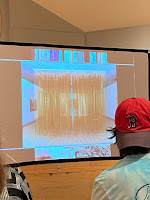Reviews
Valaria Tatera is an artist, activist, lecturer, also, a member of Bad River Band of the Lake Superior Chippewa. Her works investigate the intersection of ethnicity, gender, environment and commerce. She explores contemporary Indigenous issues, impact of colonization, and self-identity on Erasure, Visibility, and Resilience.
 |
Orange Ribbons Representing the Indigenous Issues
The Indigenous people facing high rates of poverty, food insecurity, mental and physical health issues and death in Legacy Residential Schools.
Each ribbon is representing a missing and murdered Indigenous Women (and Girls). The ribbons together feel like flowing.
Every Fruit of Justice is distinctive, unrepeatable, like a human. I found the most bright and beautiful one and took this picture.
Seeing the dried aquatic plants, died leaves, and twigs of trees, they are the original organic ingredients in river. Now, people ignoring the ecological system, damage rivers for commercial purpose. Valaria Tatera mentioned the closest example is the paper factory at the Fox River near Lawrence.
Views on Erasure, Visibility, and Resilience
Her art works are her special way of calling on a caring, tolerance, and widening equalities society, soft but strong.
Why soft?
Her works hold visual and personal space for data that often erases the individual.
No preachment
No grievances
Peaceful
I'm bored with some journalism's tricks, such as preachment of humanity and grievances of victims. With cruel revealing, they catch audiences' empathy and anger, but they never consider the views of the parties, and how the revealing will impact the individual. However, Valaria Tatera's works visualize the data of Indigenous people and MMIWG2S by erasing the individual, peacefully announcing the records and the true history.
Why strong?
Red ribbons on the white wall, striking like blood. The fruits of justice, will it ever grow.
Simple
Repeating
Visualized
Understanding and shocking
When I understand what the red ribbons represent, I was shocked more than hearing the statistic. It reminds that in the reading, Marshall McLuhan underlines "most people find it difficult to understand purely verbal concepts...in general, we feel more secure when things are visible" (pg. 117). We believe and remember more when abstract things are visualized, even though they are metaphors. That's true, I probably remember Valaria Tatera's works in my rest of my life. The word "justice" on simple repeating red ribbons becomes so visible, touchable, third dimension, and impressive. When I see "justice" in the future, I will connect it to the red ribbons and the handmade fruits, remembering the Indigenous people and MMIWG2S and Valaria Tatera.
Views on Valaria Tatera
I appreciate her works which tell her creativity, rationality, humanity, and perceptiveness. Excepts, her lecture is comprehensive and informative, relating to present issues of intolerance, inequality and ignoring in ethnicity, gender, environment and commerce.
What strike me?
Intolerance, inequality and ignoring might be part of human nature. I grew up in a neither colonial nor colonized country. Even so, there are hierarchical problems about foreign immigrants in society. Thus, I found the intolerance, inequality and ignoring are global common problems. They might be part of human nature. I don't believe that the intolerance, inequality and ignoring will eliminating in the future. But, as more people are realizing the justice, I do believe the society will be more caring and respecting different ethnicity, gender.
River pollution is normalcy. When she mentioned the river quality and the paper factory nearby, my faces creased. In this summer, I once took a walk along the Fox River, nearby the paper factory, there is a shunt with industrial waste water stinking. I saw two people walking their dogs like their smells are missing. Are they numb after smelling it for a long time? Probably. I was numb to the smelling of the Funan River in my hometown. It has been stinking in my earliest memory. Only from my grandma's description, I could imagine how good the river was, how fun they playing water in it. It's a pity for me only hearing it. The water pollution should be limited or my pity will become tragedy in the next generation .
 |
| 20 century, people still boating on the Funan River. |




This is a great reflection! I have a good time reading it
ReplyDelete